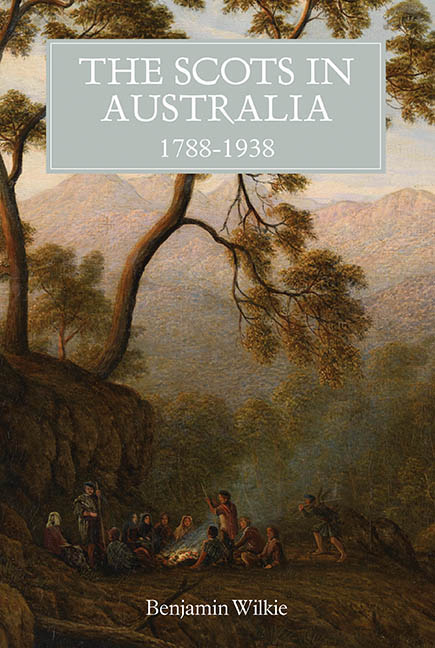Book contents
- Frontmatter
- Contents
- Illustrations
- Acknowledgements
- Abbreviations
- Introduction
- 1 From Scotland to Australia: Convicts, Free Settlers, and Encounters with Australia
- 2 Caledonia Australis: Imperial Commerce, Migrant Networks, and Australian Pastoralism
- 3 Scottish Migrants and Indigenous Australians
- 4 Imagining Home: Scottish Culture in Australia
- 5 Warriors of Empire: A Case Study of Popular Imperialism
- 6 The Empire Builders: Imperial Commerce and Migration between the Wars
- 7 New Scots: Industry, Settlement, and Working-Class Migration
- 8 At The Edge of Scotland's Diaspora: Diversity and Tension in the Twentieth Century
- Conclusion: The Imperial Legacy
- Bibliography
- Index
6 - The Empire Builders: Imperial Commerce and Migration between the Wars
Published online by Cambridge University Press: 23 August 2019
- Frontmatter
- Contents
- Illustrations
- Acknowledgements
- Abbreviations
- Introduction
- 1 From Scotland to Australia: Convicts, Free Settlers, and Encounters with Australia
- 2 Caledonia Australis: Imperial Commerce, Migrant Networks, and Australian Pastoralism
- 3 Scottish Migrants and Indigenous Australians
- 4 Imagining Home: Scottish Culture in Australia
- 5 Warriors of Empire: A Case Study of Popular Imperialism
- 6 The Empire Builders: Imperial Commerce and Migration between the Wars
- 7 New Scots: Industry, Settlement, and Working-Class Migration
- 8 At The Edge of Scotland's Diaspora: Diversity and Tension in the Twentieth Century
- Conclusion: The Imperial Legacy
- Bibliography
- Index
Summary
Pride in our country and its British foundation will enthuse the delegation to acclaim modestly but fervently its faith in the future of the Common¬wealth, and the necessity that it should be peopled by competent members of the British race.
– Archibald Gilchrist, Secretary of the New Settlers League and Chairman of the Australian Scottish Delegation, 1928On April 11, 1928, with a crowd of 8,000 present, the T.S.S. Hobson's Bay left Prince's Pier in Melbourne for Scotland with over 600 Scots on board, who were taking part in a delegation and variously seeking to encourage others to migrate, to develop trade and commerce, and to holiday and visit family. The farewell was a thoroughly Caledonian affair. The Melbourne Highland Pipe Band and the Royal Caledonian Pipe Band attended, and ‘in kilt and sporran, completed the Gaelic atmosphere’. The bands struck up versions of ‘Auld Lang Syne’ and ‘Pibroch O'Donaldhu’ and, ‘as the ship, festoons of streamers hanging from her side, moved into the channel the pipes were wailing “Will Ye No’ Come Back Again?”’ The captain of the ship was a ‘braw hielanman from up beyond Inverness’, and ‘practically every officer hails from the Land o’ Cakes and Cookies’. In a farewell speech, the chairperson of the delegation to Scotland, Archibald Gilchrist, told the crowd:
In the Empire scheme of things we are still pioneers. We are pressing forward with determination, and the busy present is hurrying to a busier future. Inquiries regarding industries and land settlement have poured in of late years from all points of the world, and will do so to a greater extent after the mission has finished its job. An infectious spirit of optimism prevails, and faith in the future of the Commonwealth is unbounded. There are no croakers on the Hobson's Bay.
Manifested in a range of cultural activities and artefacts, including the Scot¬tish regiments, monuments to national heroes, and more broadly in the activi¬ties of ethnic associations, the cultural traditions Scots maintained in the diaspora often affirmed the worth of the British Empire and highlighted their own posi¬tion within it. Many Scottish cultural organisations in Australia were, however, limited in their actual links to ‘home’, and were more involved in the re-creations of culture in a new country than in the active maintenance of overseas connec¬tions. Links were forged, nonetheless.
- Type
- Chapter
- Information
- The Scots in Australia, 1788–1938 , pp. 105 - 122Publisher: Boydell & BrewerPrint publication year: 2017

